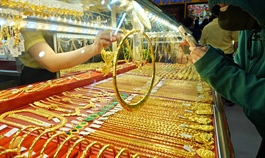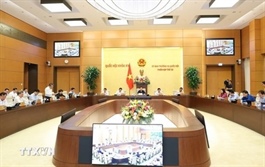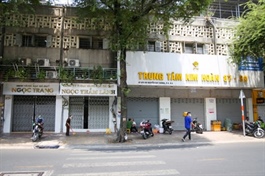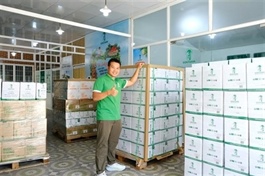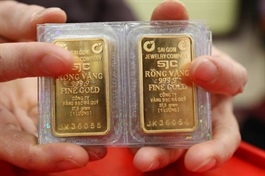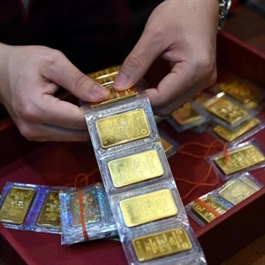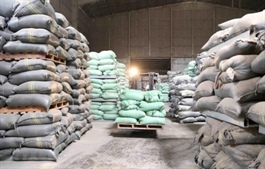Chinese electric vehicle names remain in pole position of market expansion efforts
Chinese electric vehicle names remain in pole position of market expansion efforts
Vietnam is emerging with decent prospects as an electric vehicle manufacturing hub for the region, as Chinese electric vehicle makers from Chery to BYD flock to the country.

At a meeting between Chinese investors and Chairman of Vietnam’s National Assembly Vuong Dinh Hue in Beijing last week, BYD vice president Liu Huanming mentioned their electric vehicle (EV) manufacturing plan in Vietnam and made proposals on preferential policies on the manufacturing and sale of EVs in the country.
The discussions offer hope to the much-awaited EV factory from China’s biggest EV maker. As reported by Reuters last month, BYD has slowed down its plans to build an EV factory in Vietnam due to its strategy and the general slowdown of the EV market. After lengthy negotiations with BYD, Vietnam’s Geleximco had last year reserved 100 hectares of commercial land at Phu Ha Industrial Park in the northern province of Phu Tho for the factory. But after delays, the two sides were now seeking a suitable time to start the project.
Meanwhile, Chinese EV manufacturer Chery with Omoda and Jaecoo brands last week announced a joint venture with Geleximco to establish an $800 million plant in the northern province of Thai Binh. With this move, Chery will become the first Chinese EV maker to set up a facility in Vietnam.
Zhang Guibing, general manager of Chery International, said the tie-up shows that the two sides have seen the inevitable trend of rapid change in global energy to achieve complementary advantages.
“It’s a strong combination. In the first phase, the two sides will jointly contribute capital to build a vehicle factory in Vietnam with a production capacity of 200,000 vehicles a year to provide Vietnamese consumers with new energy products under the trendy and technologically advanced Omoda and Jaecoo brands,” Guibing said.
“Then we will build an industrial cluster of complete vehicle and spare parts factories. After achieving a certain scale, it will export to ASEAN countries and others, making it one of Chery’s key bases globally,” he added.
Diversifying chains
Besides electric cars, China’s Yadea Group Holdings, one of the world’s biggest electric two-wheeled vehicle makers, broke ground on its $100 million factory in the northern province of Bac Giang in January with a designed capacity of two million electric motorcycles per year.
The second factory quadruples that of Yadea’s first factory, which has been in operation since 2019 in the same locality. Slated to begin operation in 2025, the factory will export 30 per cent of its output to regional countries, including the Philippines, Thailand, Malaysia, and Laos.
Commenting on the trend of Chinese EV makers in Vietnam, Maybank economist Brian Lee told VIR that they are looking to diversify supply chains amid rising risks of geopolitical and trade tensions.
“The United States and Europe are mulling higher import tariffs on China-made EVs, alleging unfair competition due to Chinese government subsidies. Further, Chinese EV makers have been stepping up efforts to capitalise on growing demand for EV in Southeast Asia, where EV adoption is at a much more nascent stage than in China,” Lee said.
When it comes to attracting Chinese EV makers, Lee added, some of Vietnam’s strengths include its close geographical proximity to China, extensive free trade agreements, and competitive labour costs.
“Vietnam’s domestic market shows considerable potential for EV adoption, with a fast-growing middle class, rising urbanisation and ride-sharing/ride-hailing becoming an increasingly popular transport option,” he said.
Adoption promotion
The electric motorbike industry in Vietnam is also experiencing continued growth. According to the Ministry of Industry and Trade, sales of electric motorcycles have grown by about 30-35 per cent in recent years, making Vietnam the largest electric two-wheeler (E2W) market in the ASEAN region and the second largest worldwide, after China.
According to a social listening report conducted by social media platform Vero, the on-year per cent growth rate in terms of search volume for E2W in Vietnam is 71 per cent, as measured from the start of 2019 to March 2023. The data indicates that Vietnamese consumers are increasingly exploring and considering electric two-wheelers as a viable and eco-friendly means of commuting.
“Besides the growth of E2W, Vietnam has implemented a compelling incentive for electric cars, providing a zero per cent registration fee for battery electric vehicles for three years starting from March 2022,” said Tran Kim Hoang Yen, associate PR account director of Vero.
“Over the following two years, the registration fee will be merely 50 per cent of that for internal-combustion-engine cars with the same seating capacity. The special consumption tax rate for battery electric cars has also been significantly reduced to just 1-3 per cent until the end of February 2027,” Yen added.
This policy has promoted EV adoption in the market, which can be seen that there have been many auto brands launching new EV models in the past 1-2 years in Vietnam, according to Yen.
According to Vero’s recent white papers about EVs in Vietnam and consumer perception towards Chinese auto brands, the majority of Vietnamese consumers have researched or considered purchasing an EV with environmental protection and reduced operating costs as their main purchasing driver. When it comes to Chinese auto brands, which most of them are battery EVs or hybrid cars, Vietnamese consumers have generally positive perceptions based on their wide range of options, technological features, and affordability.
However, Maybank’s Brian Lee pointed out regional peers like Thailand and Indonesia are better placed for the development of EV ecosystems than Vietnam in some aspects. The two countries are more established auto production hubs, especially Thailand, which has been host to Japanese carmakers like Toyota for decades. Indonesia has abundant nickel resources for making EV batteries.
“Nonetheless, Vietnam’s aforementioned strengths leave it well positioned as an attractive EV investment destination. Chinese EV makers will likely leverage each ASEAN country’s unique strengths and may set up production facilities in more than one location, given the impetus to diversify production,” Lee said.
“Additionally, multiple factories across the region may be needed to serve left-hand drive and right-hand drive markets, Vietnam is a left-hand drive market, while Indonesia, Malaysia, Singapore, and Thailand are right-hand drive,” he added.
He also highlighted some short-term risks that may slow down Chinese EV investments in Vietnam. The first is that EVs could be in a state of excess production capacity, which may reduce the impetus for further capacity ramp ups in the short term. BYD has slowed down its plans to build an EV factory in Vietnam amid the slowdown of global EV sales.
“Secondly, competition from Chinese EV brands could emerge as a concern for Vietnam’s policymakers, with VinFast doubling down on its efforts to gain a foothold in local and overseas markets,” Lee explained.



